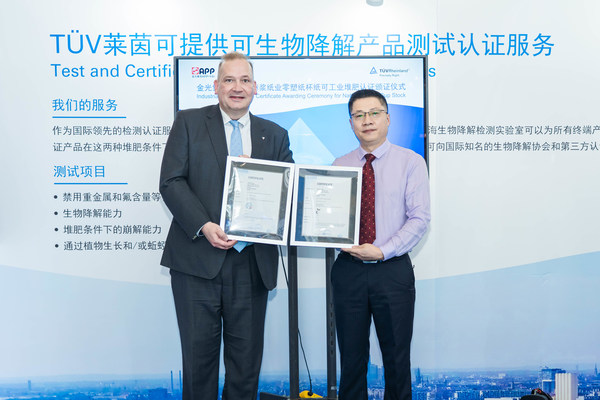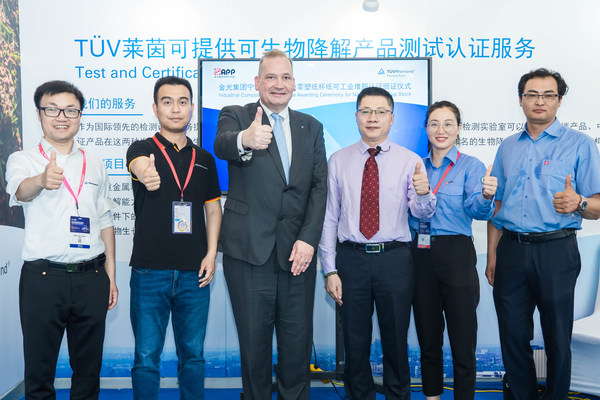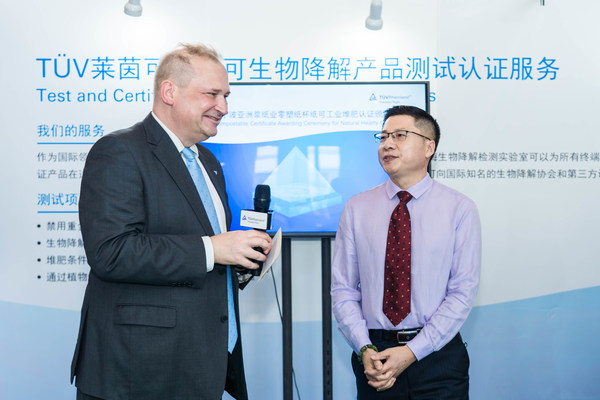TUV Rheinland Awards Industrial Composting Certification to APP Ningbo Asia Pulp & Paper Co., Ltd.
 |
NINGBO, China, May 28, 2021 /PRNewswire/ — On May 24-26, the 14th Ningbo International Plastics and Rubber Industry Exhibition was held at the Ningbo International Convention and Exhibition Center. As an international third-party testing and certification organization, TUV Rheinland Group (hereinafter referred to as "TUV Rheinland") joined this exhibition at booth D98 in Hall 5.
At the exhibition, Dr. Thorsten Keiter, Senior Vice President of TUV Rheinland Greater China, presented DIN CERTCO and European Bioplastics Association Industrial Composting certificates to APP Ningbo Asia Pulp & Paper Co., Ltd. (hereinafter referred to as "APP"). Qiu Ruquan, Vice President of Technology of the Industrial Paper Division of APP attended the certification ceremony.
In his speech, Dr. Keiter said: "Although China's biodegradable plastics are still in the preliminary stage of development, they are developing rapidly. We are committed to providing local manufacturers and exporters with comprehensive solutions, from biodegradability testing to consulting services, assisting your products to obtain composting certification to accelerate their entry into the global market."
After decades of unremitting efforts, APP has developed into one of the world's largest pulp and paper group companies, with a total annual production and processing capacity of more than 28 million tons of pulp and paper worldwide. As the world's leading vertically integrated pulp and paper manufacturer, APP has always been committed to providing high-quality products to meet the growing global demand for pulp and paper products. TUV Rheinland tested the EPP paper of APP for industrial composting. These include chemical testing, bio-based content testing, disintegration testing, and eco-toxicity testing. The product has successfully passed various tests to ensure that the product can realize an organic cycle under composting conditions, and is completely decomposed into carbon dioxide, water and inorganic compounds, and will not pollute the soil with heavy metals.
APP's Zero Plastic Paper for Cup Paper are certified by TUV Rheinland in accordance with the DIN EN 13432:2000-12 and ASTM D 6400:2019-01 industrial compostable standards.
On May 24th, Lucy Lu, Technical Supervisor of TUV Rheinland Greater China Softlines department, attended the 2021 Biodegradable Plastics and Application Development Forum and gave a presentation on the topic "Testing and Certification of Biodegradable Products – Third Party Inspection, Testing and Certification Services." She provided a detailed introduction on common compost certification marks and certification standards, confusing concepts regarding biodegradability, development of domestic standards, etc. As the world's leading third-party testing and certification organization, TUV Rheinland can provide one-stop service to companies enabling them to apply for multiple international and domestic biodegradable certifications once their product passes relevant tests.
TUV Rheinland certification services are based on professional and authoritative testing foundations, providing enterprises with relevant tests that meet differing requirements. TUV Rheinland has established a leading domestic biodegradation testing laboratory in Shanghai and obtained accreditation from the European Bioplastics Association (EuBP), German Institute of Standardization Certification Center (DIN CERTCO), American Institute of Biodegradable Products (BPI), and Australian Bioplastics Association (ABA), as well as accreditation from the China conformity assessment laboratory CNAS, CMA inspection and testing agency qualification approval, etc.
As the world's leading technical service provider, TUV Rheinland is able to provide certification services and technical guidance for enterprise products, and provide safe and sustainable solutions for solving the challenges arising from the interaction between humans, the environment, and science and technology, helping enterprises to achieve sustainable development.
.gif)











